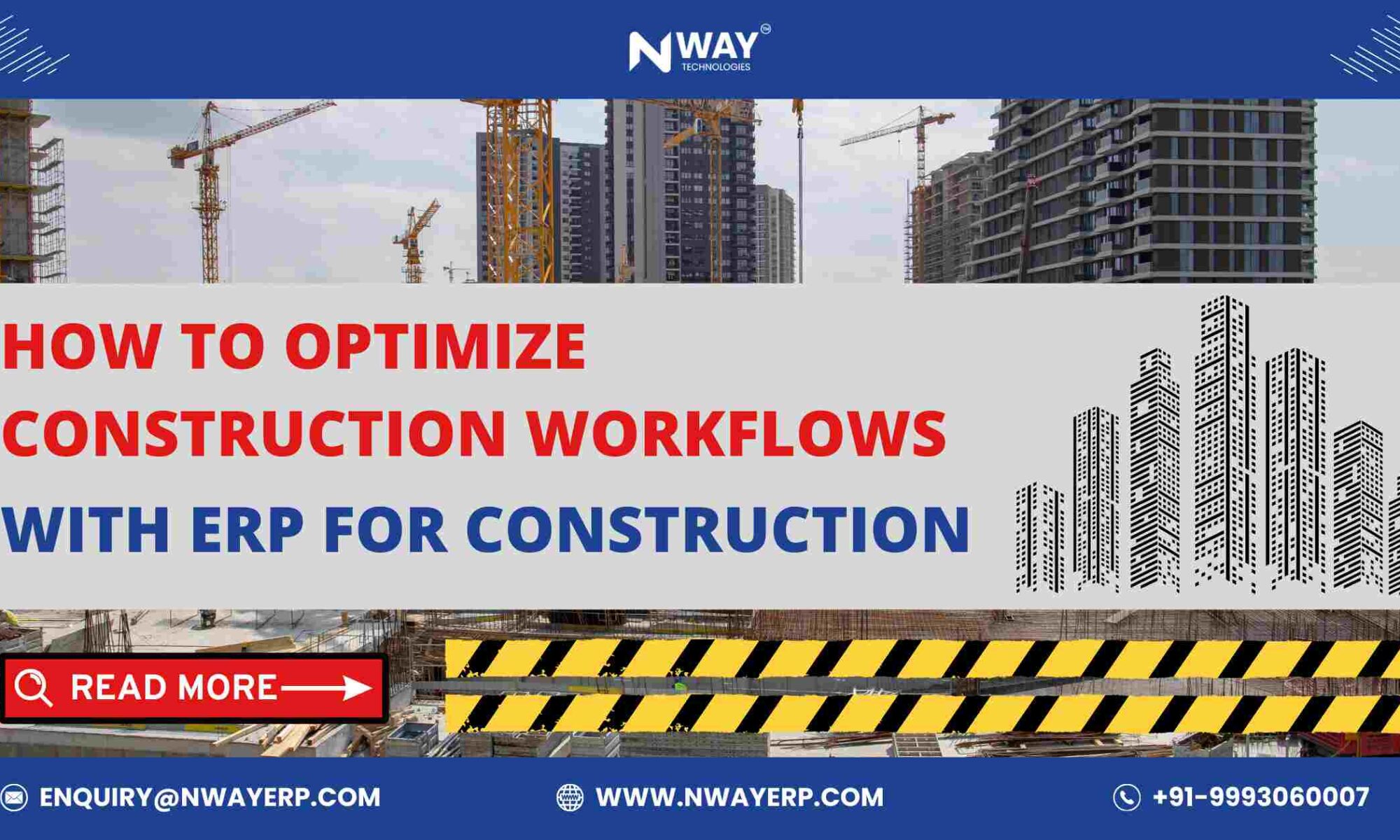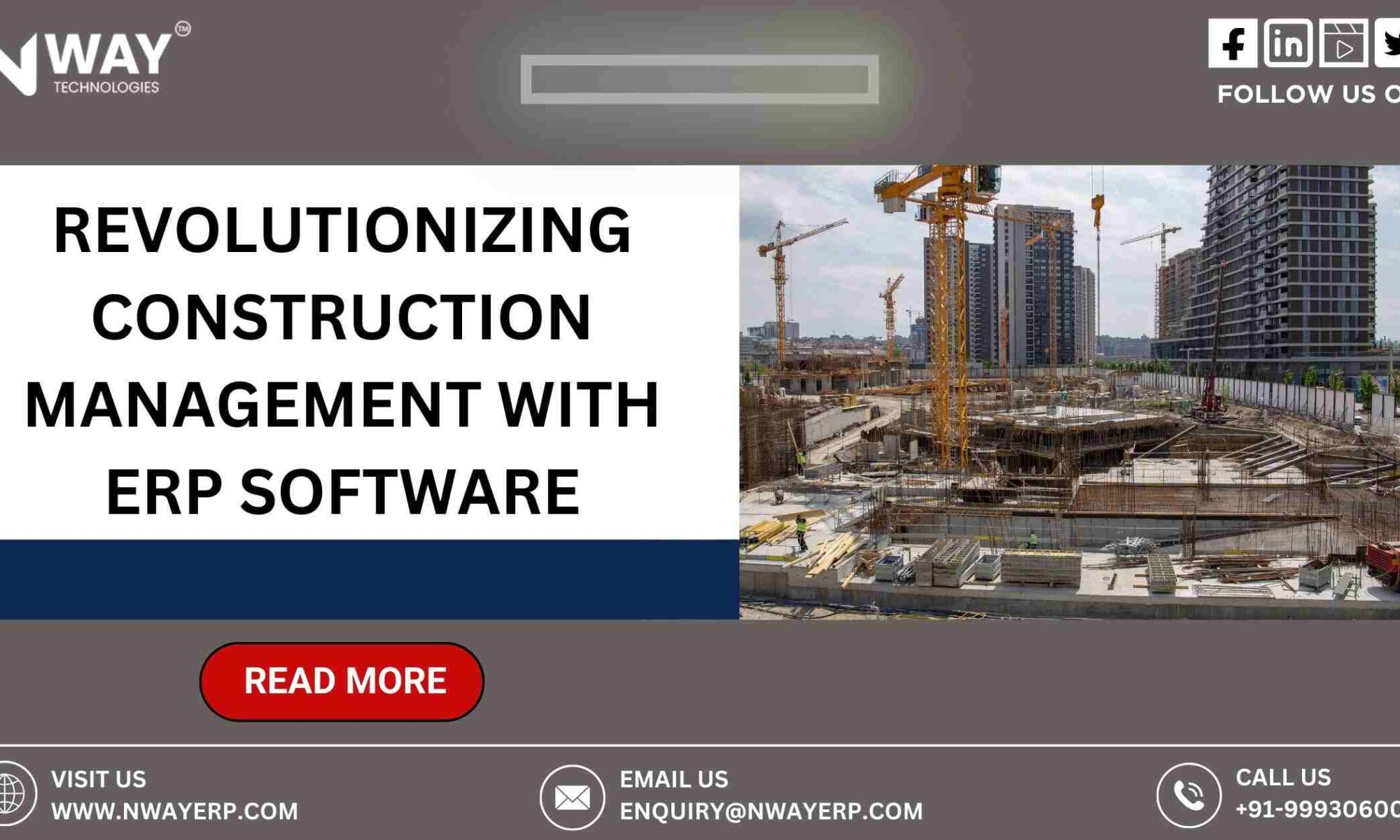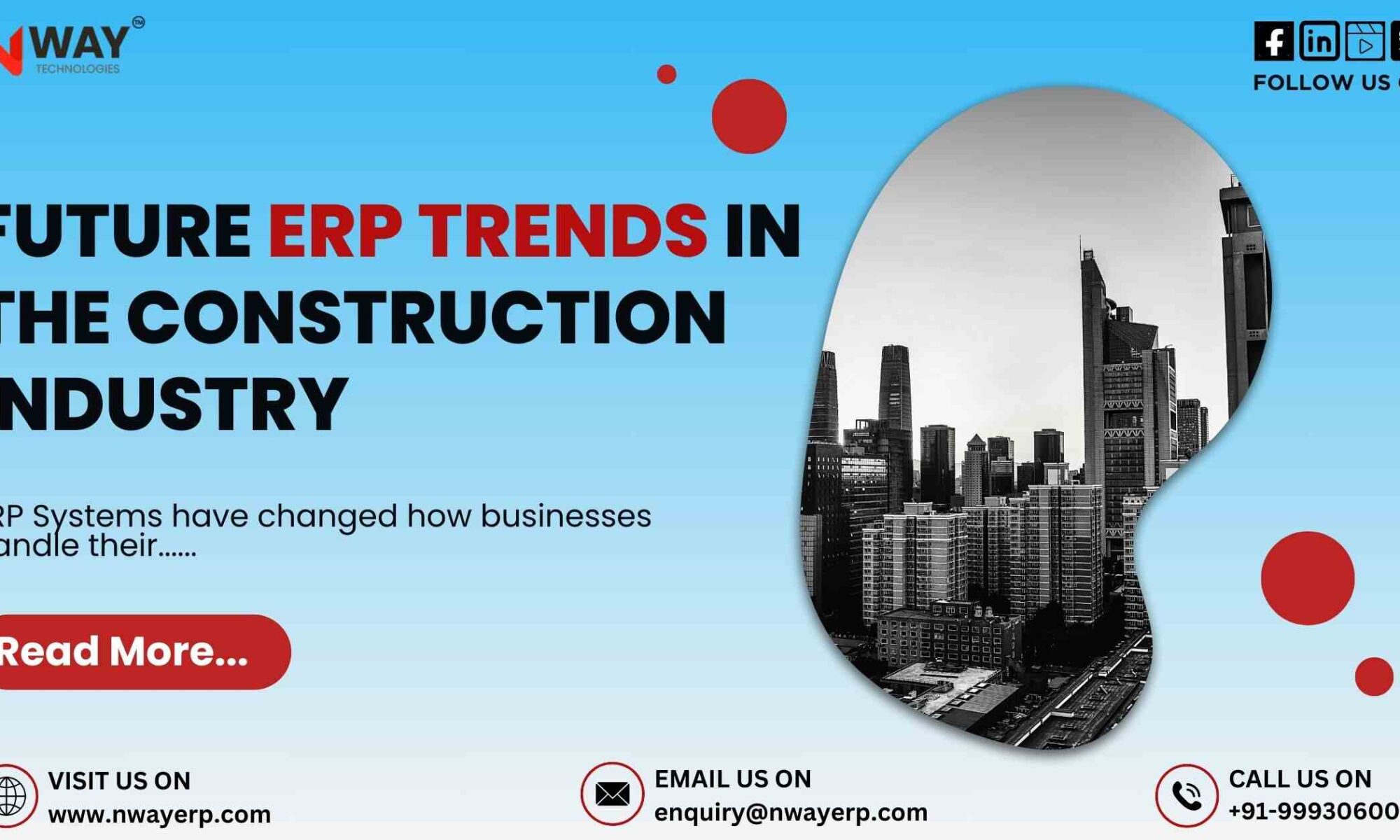The industry of construction is constantly evolving and is expected to grow by an increase of 4% between 2021 and 2031, as well as $11.13 billion expected revenue by 2023. This indicates the near wide adoption of technologically advanced platforms in the industry such as Enterprise Resource Planning (ERP). Construction ERP software will significantly improve procedures by offering a comprehensive knowledge of finances while also automating various aspects of operation.
Installing an ERP system for the construction industry helps streamline and manage the many business processes that are essential to a successful operation that will lead to improved customer satisfaction and loyalty, greater net profit and better financial performance metrics.
A system for ERP will dramatically increase the profits for companies working in the construction industry. Together, the efforts of managers, owners, and the regulators along with the use of an ERP is essential to ensure continued success for the construction business.
What is Construction ERP Software?
ERP (also known as Enterprise Resource Planning, is an array of technology and tools used to control and simplify the primary operations of every business. They also include corporate planning, performance monitoring and the management of compliance.
For more precise information collection, a construction ERP software development system unifies all of your common data into a single, centralized source. This reduces the risk of duplicate or inaccurate data being generated. Additionally, these solutions are accessible on premises as well as cloud-based ERP applications, which makes them a viable alternative for firms that work in construction.
Companies in the construction industry require rapid update and planning of their work tasks to allow for quick processing situations with their clients. Construction industries ERP software solutions are vital in modern construction firms to streamline their processes as they collect and arrange information, quickly analyze it and then distribute it to employees in the company that require the information.
Construction ERP software allows construction firms to integrate and streamline projects, make financial decisions efficiently, know how to maximize profitability, control the flow of cash, and react to risks that could arise on site. Benefits are evident: an improved business performance with increased revenue and a better net profit rate is proof of the effectiveness of this software. Customers are also able to maintain their loyalty because of efficient methods and easy access to information.
Challenges of Construction Without ERP Solutions
In the age of technological advancement and innovation, as new technologies take place, many firms working in the field of construction have found ways to tackle typical challenges. They include, but aren’t restricted to:
Inappropriate Planning
The construction industry could suffer massive losses due to poor scheduling. In the event of a delayed project’s conclusion, firms may need assistance in reducing labor costs or customer loss. the negative perception of their brand.
Construction projects require the coordination of and integrating different departments and teams located in various locations. This is challenging with manual effort which can result in serious errors in the scheduling of maintenance, channeling resources, as well as following the architectural plans.
The cash flow can be affected as well as cause labor inefficiencies as well as contractual issues throughout the construction project. It is essential to take effective measures to prevent further problems and make sure that proper planning methods are followed on every construction location.
Managing Multiple Clients
Construction industry controlling and moving data within the company isn’t easy in cases where companies are serving multiple clients all at the same time. Processes that are manual often cause slowdowns which lead to delays as well as mistakes. Making PowerPoint presentations or Excel Spreadsheets is an arduous job if the data is taken from different sources. This is not only unsafe since unauthorized personnel could gain access to confidential details.
If there is no cloud backup of these files, it is at risk of becoming deleted forever. In addition, the information that is manually managed does not provide updates in real time which makes the process complicated. To overcome this issue the need for the use of an ERP software should be implemented for companies operating in construction.
Inadequate Communication
Construction industry experts from different fields must work together to finish projects in the timeframe they have promised clients. However, crucial tasks may be overlooked because of insufficient coordination between teams and departments and can only be discovered at the last minute.
An ERP system can ensure efficient communication takes place even when the possibility of meeting in person isn’t feasible. These systems make everyone involved aware of the other’s contributions as well as any possible concerns. Thus, the implementation of an efficient ERP system is essential for successful construction projects.
A Lack of Realistic Expectations, Poor Forecasting, and Incorrect Estimations
In today’s competitive and complicated sector, the successful completion of any construction project is dependent on the accuracy of bids and estimates for the cost. However, human error as well as outdated information could cause problems regarding the accuracy of bids. If expectations of customers are met and satisfied customers are improved, the project will be completed which could lead to delays or impede the completion of projects.
To be able to keep tight budgets and deadlines that are accelerated, it’s essential for companies that work in construction industries to study requests from customers and other stakeholders prior to giving any guarantees.
Construction companies are often affected by unrealistic goals that create huge challenges, regardless of motivation for employees or benefits. The reason for this is poor planning and unrealistic expectations and expectations, particularly when they are focused on the long-term goal instead of shorter-term goals.
In order to handle the situation effectively in a timely manner, you must divide objectives into weekly, monthly and daily objectives for determining if they’re achievable. Once you have a clear understanding of these goals, communicating with your clients and other stakeholders must be carried out in a manner that is appropriate. After that, you’ll be able to create an appropriate plan that sets ambitious but realistic deadlines and budgets. ERP software can assist you to accomplish this better if used in your plan.
Taking Inefficient Decisions
Construction projects are extremely complicated with multiple stakeholder groups as well as deadlines, places and teams have to be coordinated and coordinated in order to achieve the ultimate target. To achieve this, it requires quick decision-making, and often these need be made without having access to data in real-time or current information.
Additionally, the manual processes for making decisions can be prone to human error as well as duplicated data and other detrimental effects, leading to sloppy processes. This is a major issue for organizations working in a highly competitive market that is highly competitive.
Based on these aspects, taking quick and accurate decisions based on real-time information as well as a sane process are vital to keep projects in line with the plan without delays or costs that are over budget.
The Benefits and Use Cases of ERP Implementation in Construction
Construction ERP software solutions specifically designed for the construction industry will provide enterprises with solutions that tackle the different processes of a project. This can include centralized information such as scheduling, cost management, inventory/stock management, ERP, payroll/HR management, bid/tender management and monitoring productivity.
Incorporating an effective ERP solution to their existing infrastructure firms in this field can benefit from better processes, more accurate reporting of documents as well as purchase order acquisition in addition to various other services. Users of ERP are likely to see improved process management and enhanced relationships with their customers.
Automated Operations
Many construction companies have multiple operational units at once, spread over several locations. The operations vary from managing projects to client management, cost estimation, administration of staff, and so on. The size of the business and the individual tasks could be quite extensive and challenging to control manuals.
The implementation of an ERP software is an ideal method to guarantee the precision of the tasks that are performed and also allow more time to strategically important tasks like design, marketing research, development and design. The system has many advantages which allow businesses to increase the results they achieve with a minimum of resources spent on manual tasks.
Project Management Optimization
Implementation of the system helps companies maximize their productivity, maximize projects and distribute the right resources to increase the profit margins of their businesses and cut expenses. In addition, by implementing a proper approach to managing their projects, organizations are able to avoid losses in the long run caused by costly mistakes or delay in delivery.
Adequate Internal Communication
Insufficient communication between departments within the organization can lead to delayed deadlines and even failure of projects. Construction ERP solution will eliminate the problem by offering features like chat forums that allow video interactions, calendars that are connected and more. Teams can greatly benefit from these programs, since everyone can be in touch in a single session. Therefore, any time it takes to resolve a problem will no longer be a problem to your team.
Mobile Responsive
Modern ERP software has significantly enhanced efficiency and productivity in construction firms. The ability to access powerful project data and information accessible via mobile devices can speed the overall process, avoid errors or delays through instantaneous updates and encourage more efficient processes. The easy access to ERP for construction businesses through mobile devices offers a wealth of advantages to businesses.
Enhances Marketing Strategies
An effective, well-designed marketing strategy begins by implementing ERP within the construction industry. It provides insights based on data in all aspects of business operations, including the marketing and financial KPIs. By analyzing data, you are able to design a more efficient marketing plan, which includes branding, sustainable projects, marketing campaigns via email, CTAs, and more. If you have the proper mixture of techniques built on a deep investigation of the business’s operation and processes, the likelihood of meeting your goals and targets significantly improves.
Estimated Construction Costs And Revenue
In the process of negotiating for work in the field of construction contractors are relying on estimations of cost to get the tender. A construction ERP is vital because it allows the use of predictive analytics that are based on a variety of factors, like prices and resources. An AI-powered ERP for construction could further eliminate the disparities between the project’s estimates and actual expenses and also determine estimates of revenue and. overhead costs.
These Components Are Required in a Construction ERP Software Development
In order for the ERP system to succeed for construction companies, it should include cost projections as well as over-runs as well as monitoring the entire life cycle of the project starting from bidding to handing over. When choosing an ERP system to manage construction, make certain you are considering the following aspects:
Integration Estimation
In order to ensure that the project is completed successfully of any construction project it’s important to control expectations around timeframe, budget and the quality standards. To prevent delays, cost overruns, or other concerns that could impact profits It is essential to efficiently control data and details about your project’s progress.
In dealing with clients precise estimates are essential in managing expectations. With the help of building ERP tools that offer thorough analysis and forecasts using the latest data as well as historical data, you’ll be able to guarantee that the project is completed within budget, as well as protecting your financial health.
Advanced Accounting
In the construction business, complete accounting and financial management is required that goes beyond the traditional accounting and bookkeeping. It includes, but isn’t restricted to
- Management of subcontractors
- Tracking of equipment and plant
- Subcontractor and Debtor tracking
- Oversight of operational inventory
- Management of purchase and change orders
- Cost reporting is used to determine the real costs
In pursuing these goals, a company will be able to leverage low-cost solutions that will help them achieve their goals.
More Payroll Operations
In the estimation process, it’s essential to plan time and activities for the completion of construction according to budget and in accordance with the promises. An accurate cost/. budget information and details about personnel is essential for an effective tracking and report.
In order to achieve this degree of accuracy to achieve this, your ERP solutions for construction firms will need several elements that include real-time processing of payroll as well as a summary analysis of cost of labor report on unit costs, units productivity reports Direct labor cost management, multi-project capabilities as well as on-demand revenue/cost project consolidations.
Plant, Material, and Equipment
The ERP software used in the construction industry that you pick for your company must possess the ability to handle several projects as well as manage locations as well as equipment, materials and other resources in accordance with. This is crucial given the fierce competition in the market, with very low margins.
To maximize efficiency and profitability will require efficient sharing of resources between areas, and this requires an ERP that has the appropriate functions. Therefore, it is essential to ensure that the ERP you choose for the construction sector has the capability to track the various components of a building like fabrics and tools, in addition to the work of workers.
A Detailed Financial Report
A timely and accurate reporting system is essential for the construction industry. Properly managing loss and profit isn’t easy because of the difficulty involved in a specific model of business. Yet, ERP software for construction systems that are designed specifically for project-focused context offers exactly the right solution.
Tools like analyzing utilization of resources, monitoring assets, keeping track of accounts, and reviewing corporate accounts can give important insights on performance and efficiency of operations. This ultimately helps to maximize the profitability of decision-makers by supplying them with useful data.
Safety & Health Management
The module can be a vital device for employee security. Companies that are responsible understand the importance it is to keep track of as well as analyze every incident. If you use the correct ERP software designed for the construction industry it is possible to record what transpired on site with photographs. In addition, keeping track of the incident details can help your company increase efficiency by providing scores as well as OSHA reports. This module lets your company focus on the safety and health of your workers.
Read More: Future Trends of Construction ERP Software
How Can NWAY ERP Help?
Modernizing processes and decreasing the duration required for jobs have become major issues within the construction sector. AI technology and software services can contribute to this change by providing seamless integration of software. The integration helps businesses gain access to resources, monitor project progress, control financials and assets, increase the safety of their employees, and keep better control over the projects.
Top of the line NWAY ERP system allows users to cut expenses while also ensuring punctual and timely project completion. Furthermore the ERP solutions provide greater insight of the organization, and facilitate swift and efficient decision-making. Installing the Construction ERP system for your business can help improve the efficiency of your business in today’s online global marketplace. Contact us today for a better way to manage your construction company.






